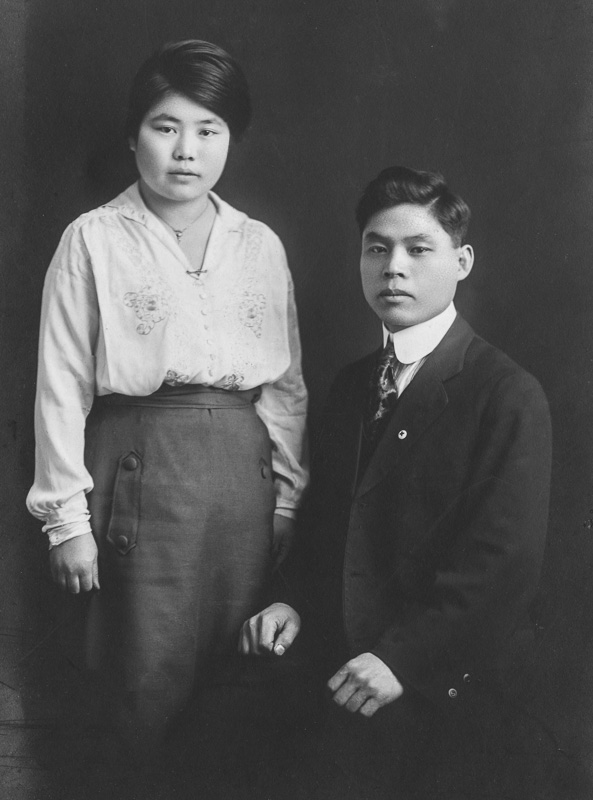
Yoshito & Takayo Ota Okada, 1920
Camp Name:
Minidoka
Block Number:
28
Barracks Number:
4
Yoshito & Takayo
Ota Okada
They may not have known one another when they lived just a mere block away from each other in Hiroshima as children, but Yoshito and Takayo would come together to build a life and family in America.
Yoshito Okada was just 14 when he immigrated to the US in 1908 from Hiroshima. His first job was working on the railroad near Loma, Montana along side his father. It would be the beginning of a lifetime of hard work.
Takayo Ota, his picture bride, stepped off the ship from Hiroshima, Japan in 1920.
When they married, Yoshito was working for Furuya Company in Seattle. Yoshito would work at several jobs before buying the Merchant Hotel across from Pioneer Square. Takayo would work along side of Yoshito as he managed hotels during the 20s and 30s and several of their children would be born right in the hotels. At the height of the depression he bought the Yakima Hotel. It was a much larger business with 150 housekeeping rooms. Due to their hard work, 24 hours a day, seven days a week, it was a very successful business.
They would have seven children total and an “adopted” son Fred Haita. They were named Yoshitaka, Kozo, Hiroo, Sumio, Yuriko, and Tokie. One child that died as an infant, was taken back to Japan for burial, as was the custom then.
After the bombing of Pearl Harbor, while the family ate Sunday breakfast, FBI agents came knocking. They searched their rooms and arrested Yoshito as he was considered a prominent Japanese businessman. He was incarcerated in the Immigration Building near by the hotel. Takayo could bring him food that he shared with fellow Japanese inmates. Unbeknownst to the family, he would be sent to a Federal Detention Center in Missoula, Montana.
Takayo was left to run the hotel by herself while raising six children. In February of 1942, after Executive Order 9066 was signed, the family was rounded up by the military with only the things they could each fit into a single suitcase. They were sent to the ironically named, “Camp Harmony,” at the Puyallup Fair Grounds where they slept in freshly whitewashed horse stalls. Their final destination would be Camp Minidoka in Hunt, Idaho.
Takayo’s health, with the stress of war, had begun to deteriorate. She had been diagnosed with Hypertension and was hospitalized while in Camp. Yoshito was released from Federal Prison to join his family in Idaho. One of his jobs would be a Block Leader.
One night, Roy could hear through the makeshift blanket wall, his older brothers asking their father for his permission to enlist in the army. His response was, “this is your country. You must do what you think best.” John would join Naval Intelligence in the South Pacific, Yoshitaka and Fred would be in the famed 442nd in Italy. Unfortunately, Fred would be killed on one of the last days of the war.
In 1943 Yoshito was released and allowed to move to Ione, WA, where his cousin had a laundry. He was able to send for his family in 1944. Sadly, their new home was a dirty abandoned house. They left for Seattle in 1945 to begin again, where he purchased the Pacific Hotel at 6th and Weller St. Even then, they would scrape together the resources to send food and medicine back to relatives in Hiroshima.
Despite the lack of a formal education, during his lifetime, Yoshito was able to buy land in Montana and run several successful businesses. He loved music, playing the violin and Japanese Oboe. He enjoyed meeting up with friends on the weekends, sharing drinks and songs. He passed in December 1982.
Takayo, the mother who had a good sense of humor and sweet disposition and who had worked so hard raising her family while working along side of Yoshito during the worst of times, died in January 1950. She had never fully recovered from her illness after leaving Minidoka. Unfortunately, she never got the opportunity to see the highly successful lives of the children she bore.
Their children and grandchildren and great grandchildren appreciate and remember them for their courage, bravery and self-sacrifice that today allows each of them to enjoy the freedoms of this country.
Fred Yoshito Okada, January 10, 1894 – December 1982
Takayo Ota Okada, July 18, 1898 – 1950
OKADAS:
Camp Harmony, Puyallup WA
Minidoka, Hunt Idaho
Block 28
Barrack 4
YOSHITO & TAKAYO
Yoshitaka, Kozo, Hiroo, Sumio, Yuriko, Tokie
(Robert, John, Roy, Frank, Arlene & Connie)